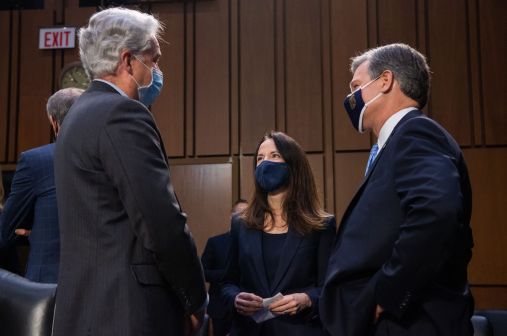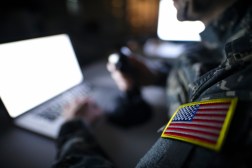FBI’s Comey defends taking battle with Apple to court, not Congress

FBI Director James Comey defended the agency’s decision to take Apple to court after the company stopped voluntary helping them to unlock the iPhone of one of the San Bernardino shooters.
Testifying before the House Judiciary Committee Tuesday, Comey agreed with lawmakers that Congress should determine how to balance privacy and national security in the digital age, but also argued the court system is well equipped to rule on urgent national security matters.
“I think that the courts are competent … to resolve the narrow question about the scope of the All Writs Act,” Comey said, referencing the centuries-old and little-used federal statute the FBI says underlies its order for Apple to cooperate with the agency. A New York federal magistrate court Monday ruled against the FBI ordering Apple to turn over encrypted, password-protected data on an iPhone in a separate drug case.
“But the broader question we’re talking about here goes far beyond phone or far beyond any case,” Comey added. “This collision of public safety and privacy — the courts cannot resolve that.”
But lawmakers hit back. Ranking member Rep. John Conyers, D-Mich., said the committee should be the deciding entity on encryption, not the courts.
Comey, however, argued that the FBI’s decision to go to court was part of the investigation of “a horrific terrorist attack in San Bernardino” — and not the discussion around encryption, which the bureau has been at the center of for years now.
“There’s a phone that’s locked that belonged to one of the killers. We think there’s a reasonable argument to have the court use the All Writs Act to have the company open that phone,” he said. “That’s what this is about. If I didn’t do that, I ought to be fired, honestly.”
The broader discussion about privacy and security “goes way beyond this case,” Comey said. When this case is eventually resolved by the courts, he continued, “it will not solve the problem we’re here wrestling with.”
Sens. Richard Burr, R-N.C., and Dianne Feinstein, D-Calif., the chairman and vice chairwoman respectively of the Senate Select Committee on Intelligence, have promised to introduce a bill requiring companies to provide law enforcement access to encrypted devices when they have a court order. It’s similar to an exciting requirement on telephone network operators to provide a facility for wiretaps. And on Monday, a bicameral, bipartisan pair of lawmakers issued a bill to create an encryption commission.
“I think it’s Congress’ responsibility to determine the expectation of privacy in this high-tech world,” Rep. Ted Poe, R-Texas, said during the hearing.
Comey claimed he is willing to work with Congress on that balance, calling it the “hardest issue I’ve confronted in government” and saying that, despite how it might seem, “there are no evil people in this debate … We care about the same things.”
“Congress has a critical role to play … and we’re playing it today, I hope,” Comey said.
Still, criticisms of FBI’s handling of this highly technical case remain.
Within the first 24 hours of possessing the phone, Comey admitted, law enforcement engaged the phone in such a way that left the bureau unable to access the phone’s data in alternative ways. Several committee members wondered why the FBI wouldn’t have the technical prowess in-house to break into an iPhone.
Rep. Darrell Issa, R-Calif., said FBI was ordering Apple to do something beyond its ethical boundaries before the bureau did its own due diligence looking for alternative ways to break the phone’s encryption, like mirroring it to avoid the self-destruct mechanism triggered when a security code is incorrectly entered 10 times. Comey also couldn’t say whether the FBI has requested Apple’s source code for the iPhone 5c running iOS 9, the combination on the phone in question, which has stronger encryption than Apple’s previous devices.
“How can you come before this committee and before a federal judge and demand that somebody else invent something if you can’t answer the questions that your people have tried this?” Issa asked. “You’re expecting somebody to obey an order to do something they don’t want to do, and you haven’t even figured out if you can do it yourself.”
Susan Landau, a cybersecurity professor at Worcester Polytechnic Institute in Massachusetts who testified later in the hourslong hearing, echoed a similar refrain.
“Instead of laws and regulations that weaken our protections, we should enable law enforcement to develop 21st century capabilities for conducting investigations,” Landau said, calling on Congress to help the FBI achieve that.
“Your job,” she told the committee, “is to help the FBI build such capabilities … that’s the way forward that does not put our national security at risk … that is a win-win and where we should be going.
Contact the reporter on this story via email at Billy.Mitchell@FedScoop.com or follow him on Twitter @BillyMitchell89. Subscribe to the Daily Scoop to get all the federal IT news you need in your inbox every morning at fdscp.com/sign-me-on.




